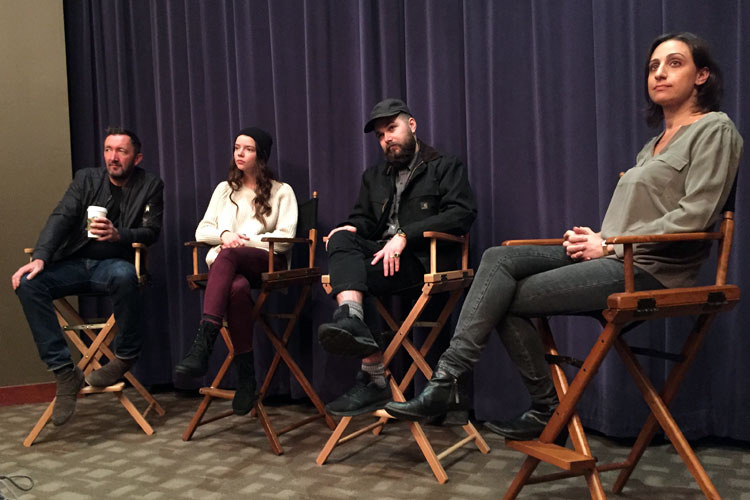The following questions and answers are excerpted from a conversation that followed the NBR screening of The Witch.
There’s an incredible attention to detail throughout the film, from the dialog to the set decoration. Could you describe how you approached these aspects of the film?
Robert Eggers: New England was the most literate part of the Western World; you had to teach your children how to read– it was against the law if you didn’t, because you had to read the bible in English. So it was an interesting time for the English language. Religion was bouncing back and forth between Protestantism and Catholicism, people were being burned at the stake for translating the bible into English, so literacy was super crucial. Common people in this period had really interesting command of language, because the Geneva bible is a really well written book! And that was what they lived by. People memorized long passages of what we’d consider totally impenetrable writing. While it wasn’t intimidating for me (I have a background in Shakespeare), I had to learn the vocabulary, I had to learn the grammar structure, and then I would pull from period sources: Sentences, phrases, and so on that I’d put in different categories so that I could use them whenever I needed them. Early versions of the script were monstrous collages of other people’s words that I then had to hone into the voices of the individual characters. I kept some things intact, such as the things the kids say when they’re possessed, or at least the things kids allegedly said when they were possessed, and threw in some other things that are basically fully in tact from the historical record. As for the accent: Originally the family was supposed to be from Essex, because most of the Puritans who came over during the great migration were from there. And I was going to do a sort of 17th-century reconstruction of an Essex accent. Which was super bizarre. For example, they would say “k-noyf” instead of “knife.” And it was just so weird, and I thought there was no way to do it naturally. But then Ralph Ineson was cast as William! And I just loved his voice and Yorkshire accent. I did a little research and found that the oldest timber-frame house in New England that still exists was made by a man from Yorkshire around this period who came here – and he didn’t get along from all these bastards from Essex – and he moved his family out, didn’t join the church until years later, and I thought… this is perfect! So that’s how the family became a Yorkshire family.
“as soon as he saw me, the horns would go down and he’d start pawing the ground”
Can you talk about working with the animals? The casting of Black Philip was pretty phenomenal; that’s one creepy goat!
Eggers: Initially we were supposed to have three goats: One who could rear, one that could buck, and one that could stand still. And we ended up with one goat that didn’t want to do anything except what he wanted to do. Ralph, I think you might be able to add to this…?
Ralph Ineson: Ah, yes. Charlie the goat. I had to fight him what felt like every day of the shoot. I’m sure it wasn’t actually like that, but that’s how it felt. He had two modes, as Rob alluded to, which were sleeping, and attacking me. For whatever reason he hated me; for most people he’d sit and chill, be cool… but as soon as he saw me, the horns would go down and he’d start pawing the ground… he just hated me. And the feeling was mutual! I hated him as well. To make matters worse I had to lose about thirty pounds for the role, so I was at my skinniest and weakest; he weighed about fifty pounds more than me. A big solid lump of muscle, and I had to maneuver him around a lot. So yes, we fought just about every day of the shoot, and he won every time. He put me in the ER three times, he detached a tendon from my rib at one point, so I kind of spent most of the shoot rattling with painkillers. But he was really, really horrible and wouldn’t do a single thing he was supposed to do, is the long and short of it.
Thomasin’s actions at the end of the film are fascinating. Why do you think she does what she does?
Anya Taylor-Joy: Rob and I have talked about this a lot. People have had such different reactions to the film as a whole, and to the ending in particular. And it’s really important to us to keep that possibility of bringing your own interpretation to it for the audience. Just because we think about it in two different ways doesn’t mean one of us is right and one of us is wrong. That said, for me, I think it’s like she’s got nothing left. It’s not a choice. That doesn’t mean that she doesn’t enjoy it! The situation has basically pushed her to that point, and what is she going to do? Go back and live in a house with all of her dead family? She’s got to go somewhere and do something, and I guess that coven is a good place to go.
Eggers: There’s a play called the Witch of Edmonton about a little old lady who is continually abused– spit on, kicked, scorned – and called a witch. And eventually she just throws her hand up and asks Satan to make her a witch, because she wants to curse all these bastards who have been mistreating her.
Taylor-Joy: Yeah, there’s definitely intrigue in there from her. She’s definitely started to wonder, what is this? What am I being accused of, exactly?

